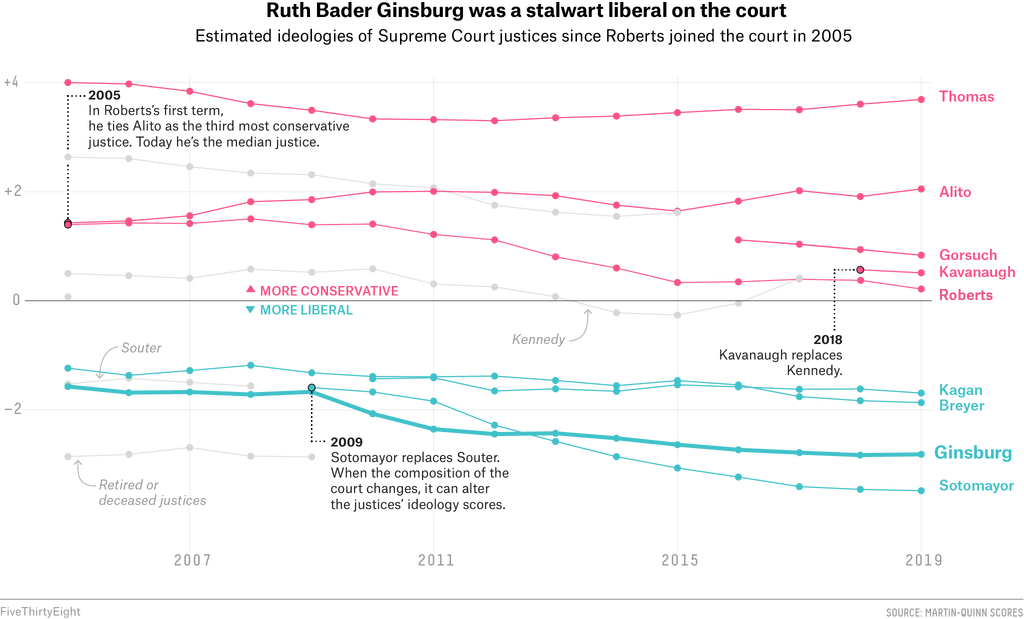On the Supreme Court, Mitch McConnell’s pretzel logic

Senate Majority Leader Mitch McConnell says there’s a reason why it’s okay to push through confirming a Supreme Court Justice now, just before the election, and it wasn’t when Barack Obama nominated a Justice in his last year as president. Let’s examine his justification and see if there’s any way it makes logical sense.
The logic of blocking Obama’s pick in 2016
When Barack Obama nominated Merrick Garland for the Supreme Court in March of 2016, after the death of Antonin Scalia, Mitch McConnell refused to hold hearings or vote on the nomination. There are two ways to look at McConnell’s action:
- Based on logic. McConnell reasoned that the people should weigh in on the opening, based on who they chose to be the next president and members of the Senate in the next term. His statement at the time: “The American people should have a voice in the selection of their next Supreme Court Justice. Therefore, this vacancy should not be filled until we have a new president.” You can argue whether this was fair at the time, but it is at least a logically consistent position. The precedent is, in an election year, the new president gets to make the pick.
- Based on naked political calculation. When McConnell made this move, I posted “A Moneyball analysis of Mitch McConnell’s Supreme Court defiance.” I analyzed the potential outcomes for the median Supreme Court Justice (the swing vote) based on McConnell proceeding on Obama’s nomination, or waiting. I proved that the median justice would either the same, or more conservative, if McConnell waited. This analysis proved accurate: after two conservative Justices appointment by Trump, the median justice is now John Roberts, who is significantly more conservative than the previous median justice, Anthony Kennedy.

What’s McConnell’s logic in moving forward with Trump’s pick?
The naked political calculation for McConnell to push through Trump’s pick to replace the late Ruth Bader Ginsburg is much clearer than in 2016. McConnell has a Republican president and a Republican majority in the Senate. Either could be gone by January. So from an opportunistic perspective, a conservative justice would be a lot more certain to be confirmed now than if McConnell waited. Assuming the nominated justice is quite conservative, the swing vote would become Brett Kavanaugh, who’s more conservative than Roberts.
But McConnell claims that there is a logical (as opposed to political) reason for considering Trump’s pick when he refused to consider Obama’s. His statement:
In the last midterm election before Justice Scalia’s death in 2016, Americans elected a Republican Senate majority because we pledged to check and balance the last days of a lame-duck president’s second term. We kept our promise. Since the 1880s, no Senate has confirmed an opposite-party president’s Supreme Court nominee in a presidential election year. By contrast, Americans reelected our majority in 2016 and expanded it in 2018 because we pledged to work with President Trump and support his agenda, particularly his outstanding appointments to the federal judiciary. Once again, we will keep our promise.
President Trump’s nominee will receive a vote on the floor of the United States Senate.
So now the precedent is, supposedly, that if the President and the Senate are controlled by the same party, it’s okay to confirm a pick.
Consider what you have to believe to accept this logic:
- Voters in 2016 deserved a chance to weigh in on the president who would nominate a Supreme Court Justice, but voters in 2020 do not.
- Voters in 2018 elected Republicans as a “check and balance” on a Democratic President, but voters in 2020 who want to “check and balance” Trump will not get the chance.
- When the President and Senate majority are of the same party, they should be able to do whatever they want. When the President and the Senate are of different parties, then you have to wait and see if things might change before you act.
None of this makes sense to me. If you think people elect senators as a check on the president, then it makes sense to see if they will now elect Democrats as a check on Trump. I don’t care what party you support — the pretzel logic is just impossible to credit.
Politics and the Supreme Court
Here’s an alternate explanation: in 2016, it was not wise for McConnell to hold hearings on Obama’s nomination of Merrick Garland, because Republican Senators would have to invent reasons to reject him, demonstrating their partisanship. Avoiding the hearings and the vote meant that Republicans could gamble on things getting better electorally (which they did), and avoid the political risk of rejecting a moderate nominee before the election (which they also did).
In 2020, a Supreme Court Justice nominated by Trump and confirmed to the court would avoid the risk of a democratic president and Senate nominating a liberal justice in 2021. Moreover, such a justice could have the chance to weigh in on election disputes in the 2020 election. This is a very alluring prospect politically for partisan Republicans. It makes up for the political risk of voting before the election.
It may even happen that Senators vote to confirm the justice after election day, but before the election is decided (say, in mid-November). This would be the ultimate lame duck move — Senators avoid the political risk of voting before the election, but then a Senate about to leave office votes on a justice who can put a thumb on the scale for the presidential candidate of their own party.
As Nate Silver has pointed out, the dominant influence of rural voters in low-population states gives them disproportionate influence in the Senate. This means that rural voters carry more weight in Supreme Court nominations — and of course, rural voters are more likely to be voting Republican. If you buy this analysis, then the period of 2021-2023 could be an unusual window in which both the Senate and the presidency are held by Democrats. Is it any wonder that Mitch McConnell wants to avoid a Supreme Court nomination happening in that window?
Whether logical or not, apparently there is historical precedent for proceeding when the President and Senate majority are of the same party. I doubt anyone ever called politics logical. Also, I read the Biden made a passionate speech in 2016 calling for the Senate to advance and approve Barack Obama’s choice; now he was also reversed his position.. Again, to expect political process to bow to logic and consistency of principle is to expect too much.
Sadly, I’m disgusted with the whole “political partisanship” thing… I don’t know what changes the election will bring but there WILL BE changes to the mix and it will be interesting to see what they are.
Add to your list of “things you need to believe” bullet points, is that the “Since the 1880s” statement is actually true. It isn’t. According to a piece I read in “Slate” this morning, “[i]n 1988 (an election year!), the Democratically controlled Senate confirmed Anthony Kennedy—President Ronald Reagan’s nominee to the Supreme Court. McConnell tried to circumvent this reality by crafting his new rule to exclude any vacancy “that arose” in an election year (Lewis Powell retired in late 1987).”
Full article here: https://slate.com/news-and-politics/2020/09/ruth-bader-ginsburg-death-mitch-mcconnell.html
I know it’s slightly beside the point of your post, which is about pretzel logic. But to base pretzel logic on statements that are only certifiably half-true to begin with is even more infuriating.
Mitch McConnell might as well say that the Senate should only vote in odd-numbered months in even-numbered years, excluding any year with an eight or six in it. Ridiculous and completely hypocritical.
either side would do exactly the same thing under these circumstances.
this is not a right or left thing its a political tactic thing
we need less faux outrage from both sides
It’s so transparently political, so why is McConnell pretending it is some sort of weird precedent?
Yes, that’s my point. Just say as much. Don’t pretend that this action is anything but. It’s the very definition of bullshit.
Upon first blush, it appears it is simply the sides flip-flopping, but some think otherwise:
https://www.nationalreview.com/2020/08/history-is-on-the-side-of-republicans-filling-a-supreme-court-vacancy-in-2020/?fbclid=IwAR13VoSvtLCNS37c29K819rdWTJ_8p6mJoPJFH1sgfWLnQWcTZjUkiZNcF0
It strikes me as maybe the most brilliant political move in our lifetime. The Senate said no to the President before he nominated anyone, got the President to nominate a relative moderate, and had the option to confirm that choice until the new, friendly President was elected and likely would have confirmed him had the new, less-friendly President been elected. That is brilliance that will be discussed for a while.
Your comment and the article you linked to can be described extremely simply as “We control the Senate and so we can do whatever the fuck we want.”
That’s a hell of a precedent. It basically describes an America in which the two parties don’t work together for anything.
It would have been more honest if McConnell has said “We control the Senate so we’re doing whatever the fuck we want.” Calling it “precedent” doesn’t change what it is.
Of course it is McConnell saying, “We control the Senate so we’re doing whatever the fuck we want.” The only reason they don’t say it that blatantly and honestly is because they are politicians so everything must be spun. Anyone who doesn’t believe that is exactly what is going on hasn’t been paying attention the last 10-15 years. Partisanship started raising sails during the George W Bush administration and totally left the harbor when Obama was elected. Probably won’t sail back for another two or three presidential elections.
The Supreme Court justice nominees should require a 60% vote in the senate. That gives either party the power to block a candidate. It also requires votes across the aisle for confirmation, ensuring that the candidate is someone who is respected for his or her jurisprudence, not simply a mouthpiece for one party or another.
There will always be a senate majority, if slim. That’s not a way to make such a monumental, lifetime appointment. We want someone whom either side views as qualified and able.